2023 is the Year of Emotional Well-Being. It has to be.
By this time next year, we’ll be screaming at each other about politics again, worrying whether our democracy is hanging in the balance. It won’t be, but that’s what the media will want us to believe to keep us clicking.
We have to focus on ourselves right now, while we can.
To varying degrees, we’re all suffering from post-traumatic stress. How could we not? Over a million of our neighbors and family members died. Our kids were deprived of precious life experiences and learning. We’ve grown apart from our friends.
Don’t get me started on what’s happening to women and teen girls.
Ok, get me started.
In 2019, 46% of U.S. teen girls characterized themselves as “happy,” while just 16% were “unhappy.” The rest were in the middle. By the end of 2022, 35% identified as happy and 31% (nearly double!) were unhappy. Heartbreaking.
Look at the disparity in mental and emotional well-being between Gen Z women, 25+ women, and the general population since late 2021:
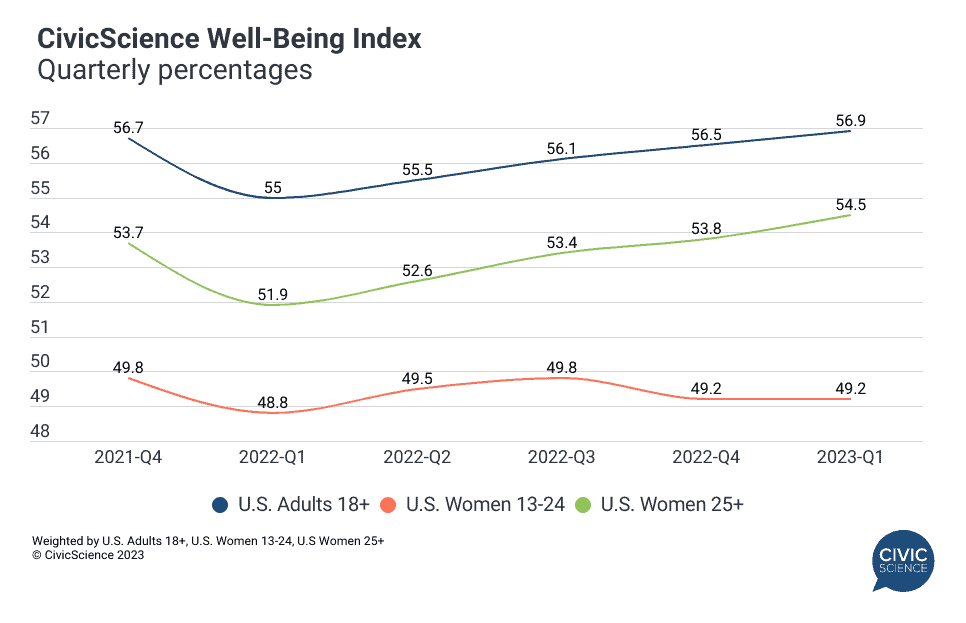
After bottoming out last spring, well-being among most Americans has steadily progressed. The orange line, however, is a disgrace. Yesterday marked two years since we lost our 15yo niece. Name one thing we’ve done – one bill, one major public investment – to address this problem since.
Social media is an easy whipping horse and, indeed, has done no favors for teen mental health. But our data suggests there’s more at work here than self-esteem.
If anything, our collective self-image has improved dramatically over the past 8 years:
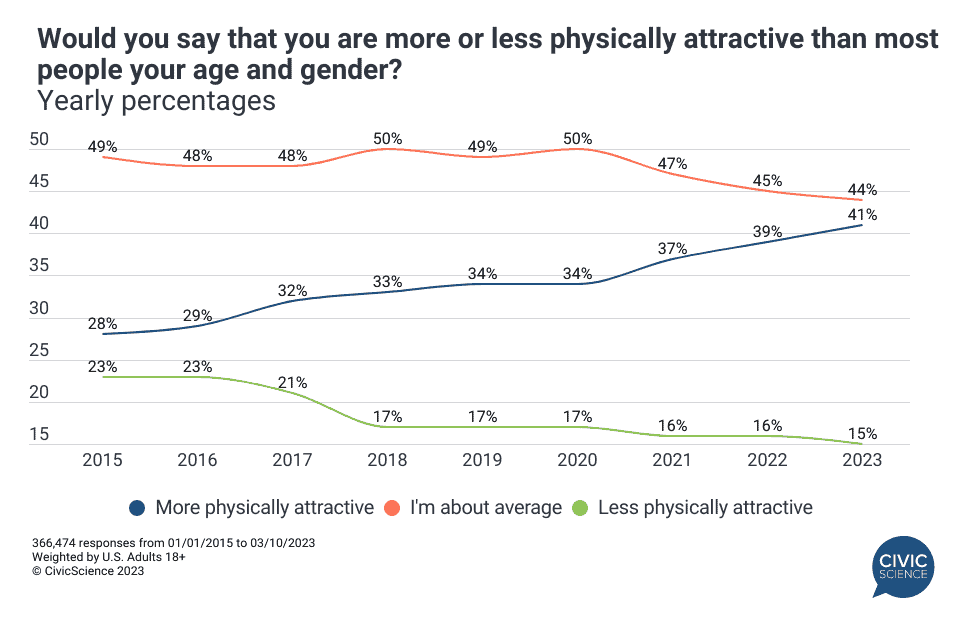
This trend is consistent across demographics, including Gen Z girls. Self-confidence and self-worth don’t seem to be the main culprit. Rather, the forces driving stress and despair are external, environmental, and beyond our individual control.
So, consumers have shifted their mindset to self-care. While in 2020 and 2021, spending was dominated by practical needs like TVs, home office tech, and renovations, we’re now watching surges (and splurges) in categories like travel, beauty, and dining out – because they make us feel better. We’ll cut back elsewhere to make the economics work.
And that’s the critical point for companies fretting about the economy and inflation. People aren’t going to reduce their spending across the board. They’ll trade off in categories they value least, to fund the ones they value most.
At least for right now, emotional well-being is high on that list. Figure out how you fit in that story or prepare to lose.
Here’s what we’re seeing:
Women remain worse off – financially, physically, and emotionally – compared to men since the beginning of the pandemic. For the record, I started working on the above prologue early in the week, before I knew what studies were on the docket OR that International Women’s Day was Wednesday. It’s uncanny how much of this week’s content is on theme. For example, we published our updated data on the overall state of women coming out of COVID – and the numbers still suck.
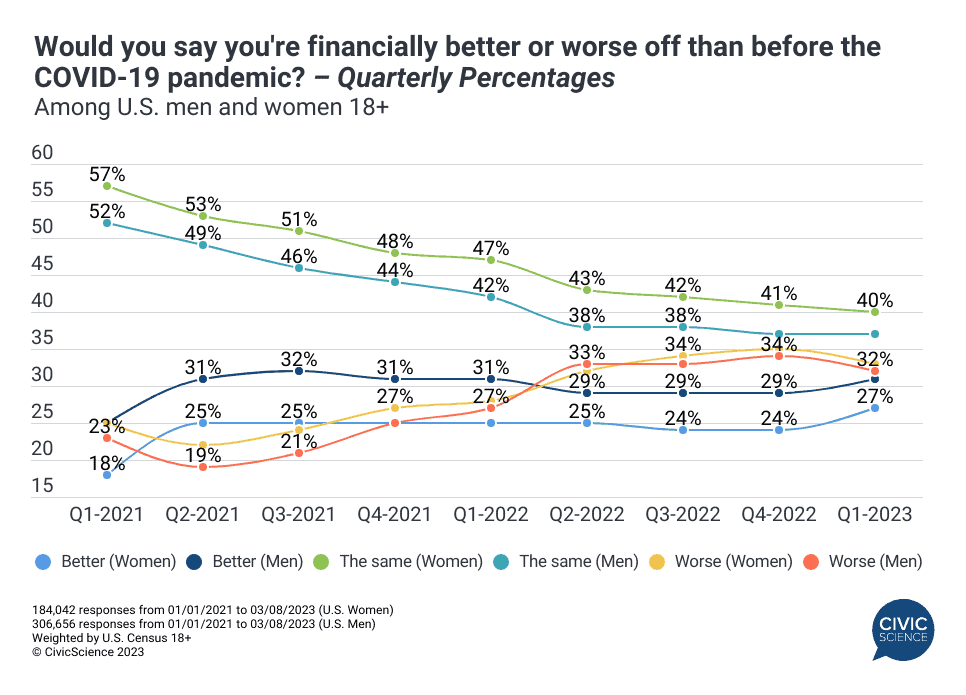
As we near the three-year anniversary of lockdown, people have moved past COVID, for the most part. While 1 in 10 Americans still say they are ‘very concerned’ about being in public spaces, the percentage who say they’re ‘not at all concerned’ just reached the highest levels we’ve seen since we last had a full office on March 13, 2020. Only 7% of U.S. adults say COVID precautions still play a major role in their day-to-day life, down from 18% a year ago. The effects of Long Covid on people and their work, though, are still lingering. And, you guessed it, the impact of Long Covid on women in the workforce significantly outweighs that of men.
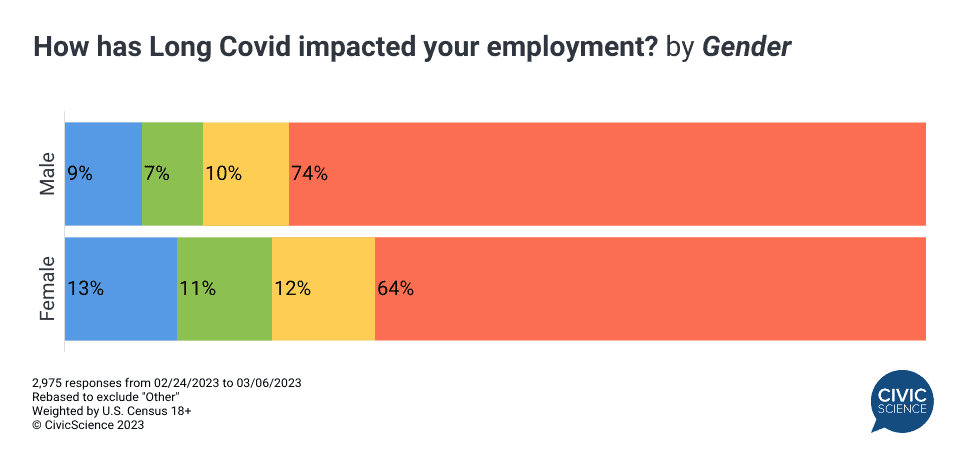
Interest in non-invasive cosmetic procedures has remained remarkably steady over the past three years, but they still appeal more to younger adults. Gen Zs and Millennials report much higher usage and intent of things like dermal fillers, enzyme peels, and Botox injections, compared to older generations. On its face (get it?), this might seem at odds with my point above about attractiveness. But not necessarily. Ask anyone in the beauty and cosmetics industry and they will tell you there has been a major sea change over the past two years, from people using beauty regimens to look better to using them to feel better.
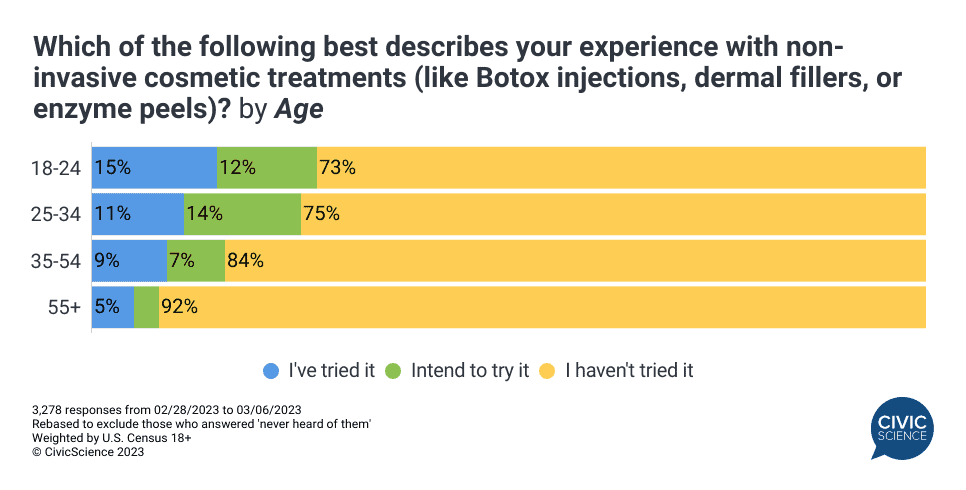
Travelers are increasingly less reluctant to fly – even due to costs – except for United customers. We published our latest State of the Travel Industry report this week, which you can download here or see a cute little infographic here, if you’re lazy. Overall, Americans are losing their inhibitions about air travel, with costs and cancellation fears essentially tied as the biggest remaining deterrents. COVID concern is now at the bottom of the list, along with fears of fights and confrontations among passengers. Curiously, air travel reluctance across the board is highest among United flyers. I’m sure someone smarter here than me can explain why. I have no idea. And here are a few other interesting travel factoids.
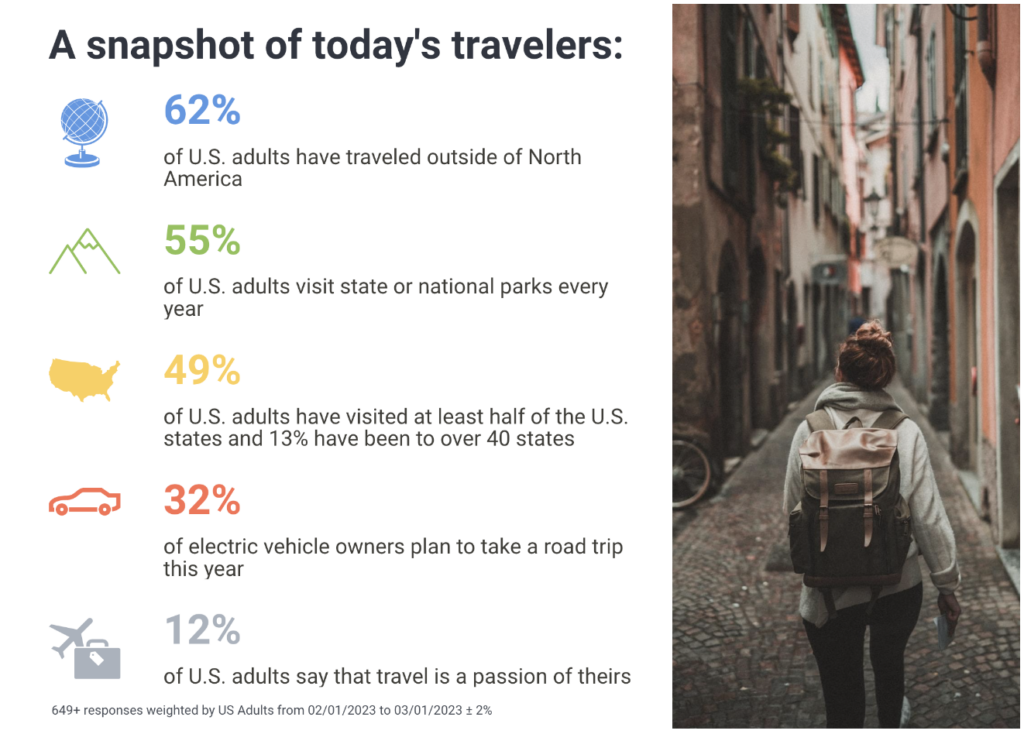
Self-care doesn’t mean self-checkout. As retailers and QSRs wrestle with workforce shortages and a huge financial incentive to automate operations, customers are turning against self-checkout kiosks. Sixty percent of U.S. adults say they prefer a warm-bodied cashier over a DIY grocery checkout, if given the choice, up from 54% two years ago. Technical glitches are a major driver of anti-kiosk sentiment. But surely, our desire to interact with a living, breathing human being is resurgent as well – a trend that appears particularly prevalent among Trader Joe’s shoppers. Maybe we’ve finally reached a point of screentime backlash.
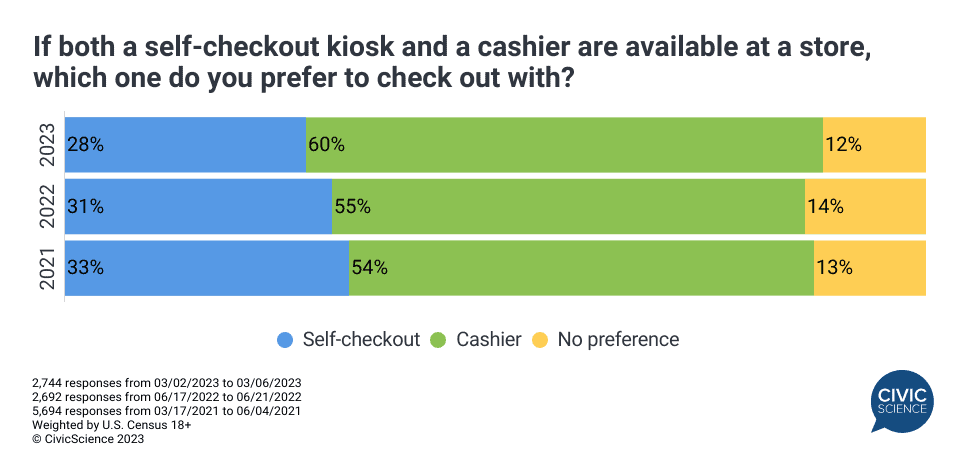
We used to read and watch what matters, now all that matters is what we read or watch. Our podcast is back for an abbreviated new season and we kicked things off with Chris Cuomo as my latest guest. We had an incredibly candid conversation about his career, his departure from CNN, how he’s trying to reframe national news around the problems that actually matter, and why he’s so envious of my hair. Check it out.
More awesomeness from the InsightStore this week:
- Seventy-three percent of people now support permanent Daylight Saving Time, while 39% say they don’t get enough sunlight;
- Interest in March Madness has fallen pretty substantially from last year;
- Aldi shoppers are 2X more likely than non-Aldi shoppers to own an EV and 2.5X more likely to use cannabis;
- The majority of Americans still eat cereal for breakfast and Cheerios rule;
- Top Gun: Maverick is the most popular Best Picture nominee, by a mile, which means absolutely nothing to Academy Awards voters;
- In our 3 Things to Know this week, people of all age groups expect AI to have a net negative impact on their quality of life over the next decade.
The most popular questions this week:
- Do you think being conventionally attractive does or does not give athletes an edge in competition?
- Do you find it fair or unfair to cast judgment on adults for living with their parents?
- Do you typically engage in adventurous activities like snorkeling, ziplining, or kayaking while traveling?
- Do you believe it’s fair or unfair for a private citizen to be fired from their job over their social media behavior?
- How much would your spending habits change if your financial situation significantly improved?
Answer Key: My knee-jerk reaction was no, but the more I think about it, yes; Unfair – to each their own; No, how are you supposed to hold your cocktail?; Fair; Not much.
Hoping you’re well.
JD








